Module 6 War and Peace课件
文档属性
| 名称 | Module 6 War and Peace课件 |
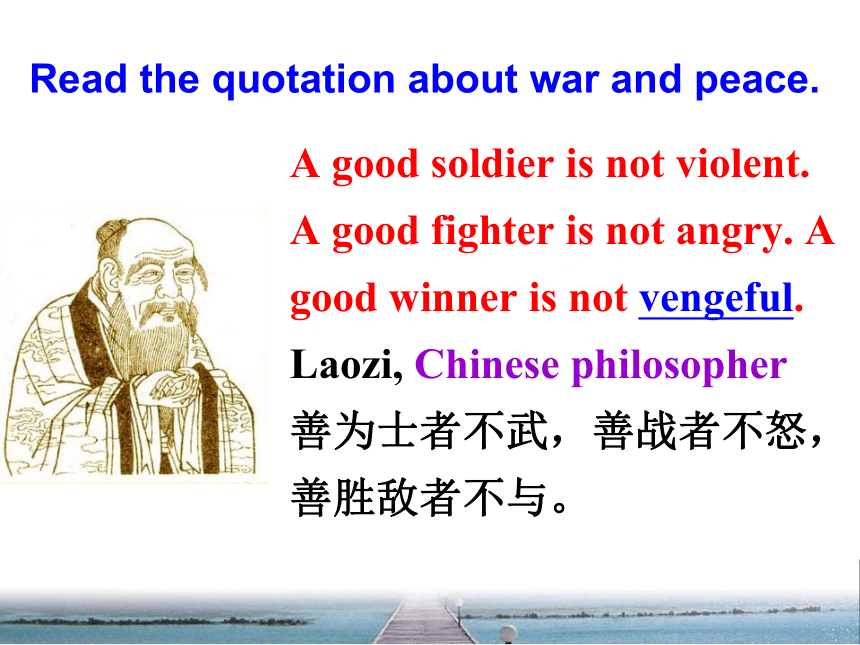
|
|
| 格式 | zip | ||
| 文件大小 | 2.1MB | ||
| 资源类型 | 教案 | ||
| 版本资源 | 外研版 | ||
| 科目 | 英语 | ||
| 更新时间 | 2014-02-16 17:13:54 | ||
图片预览

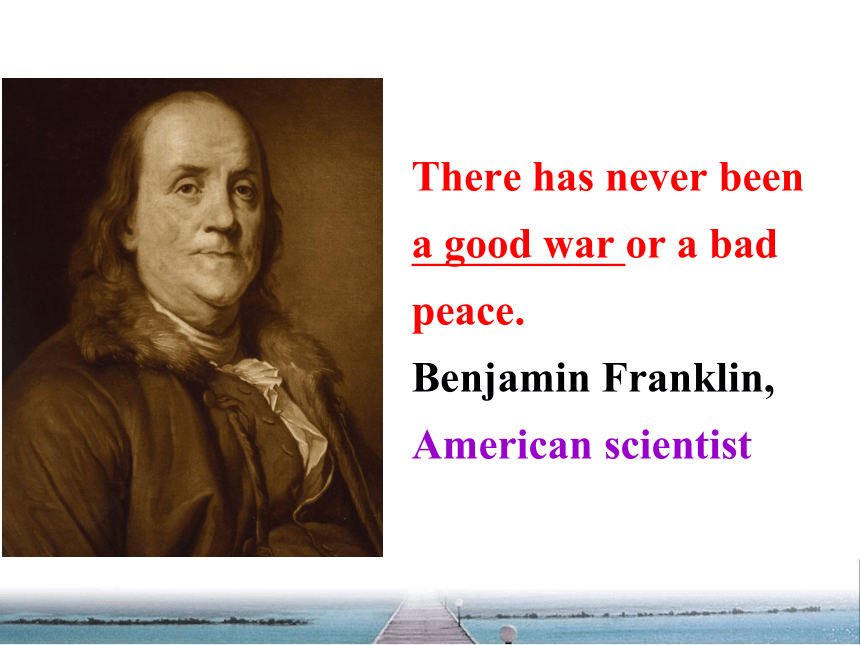
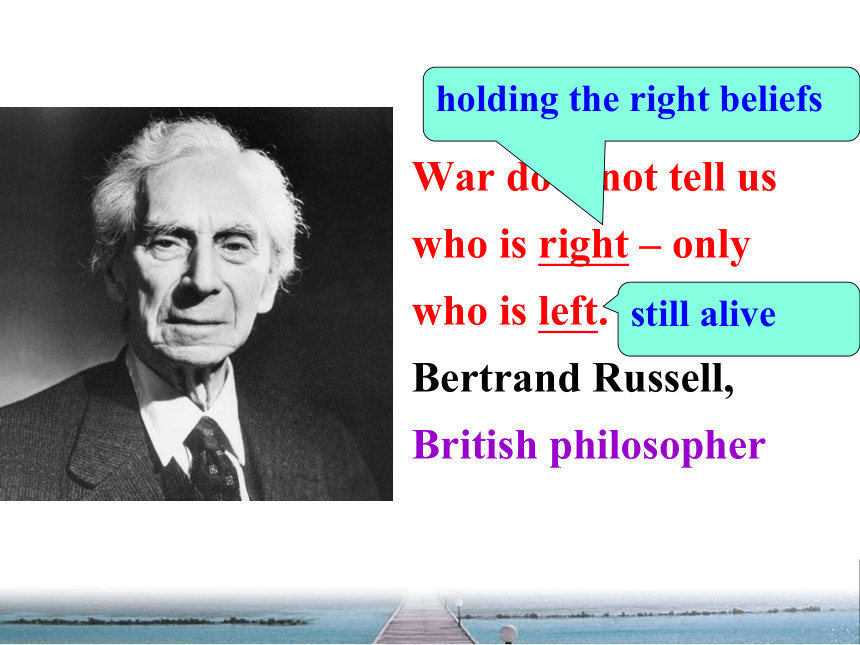
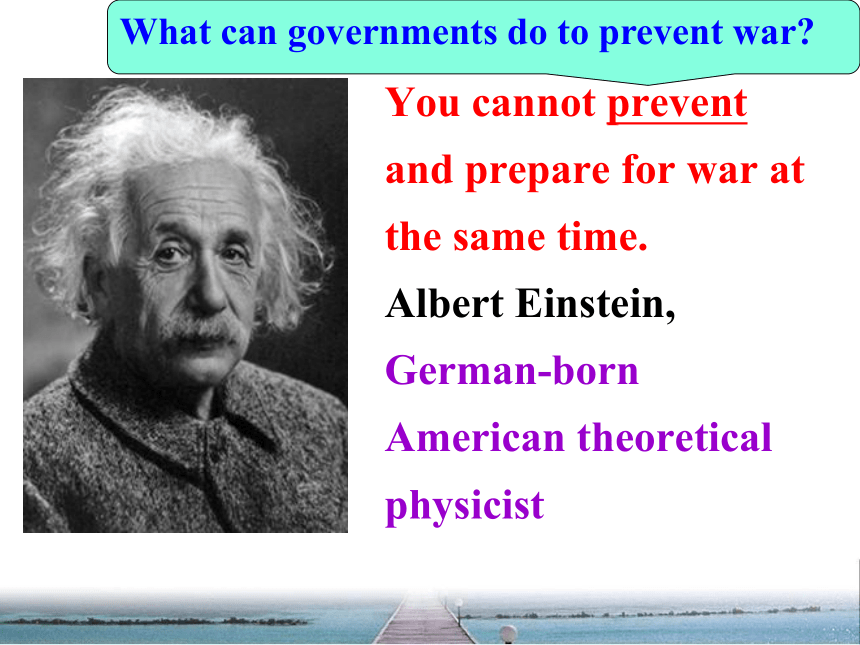
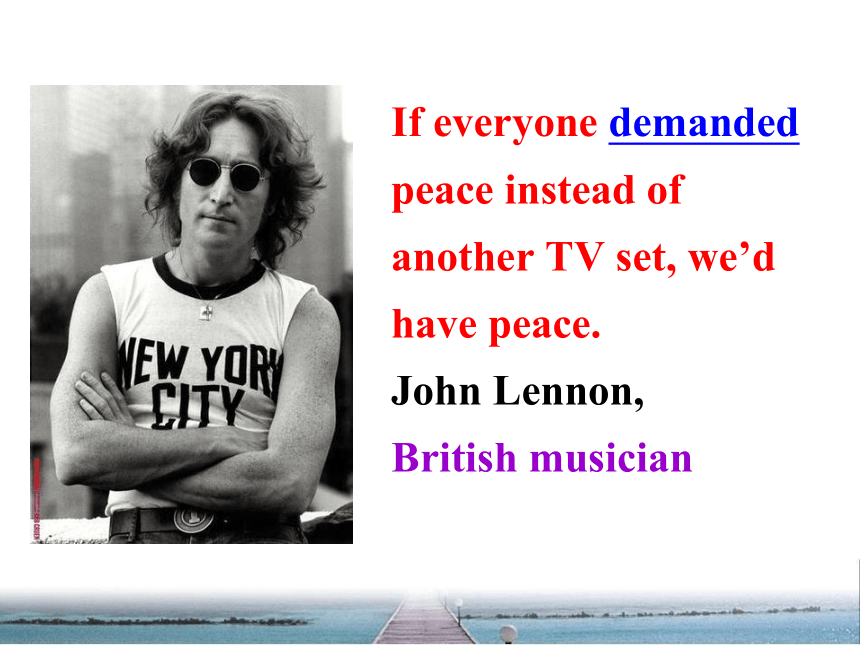
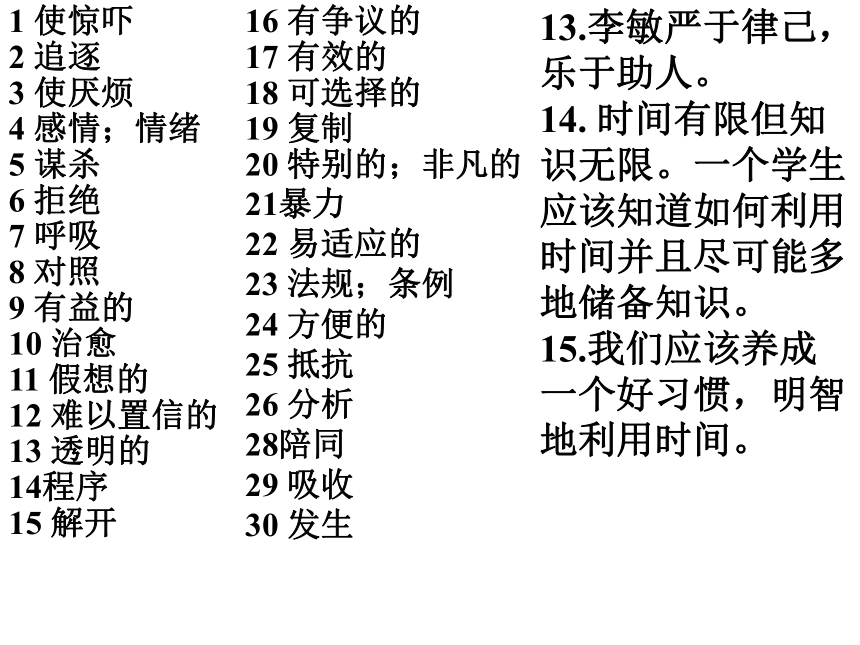
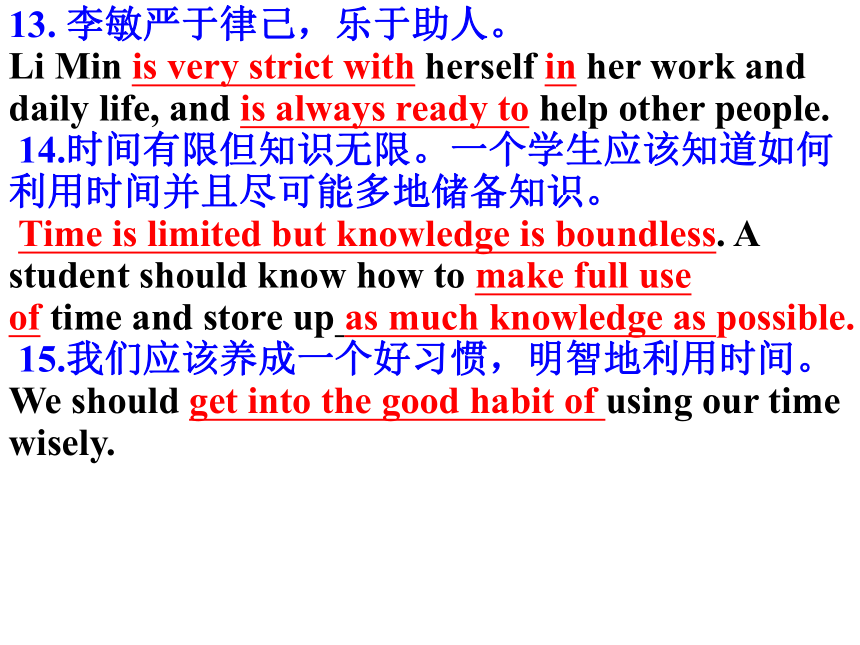
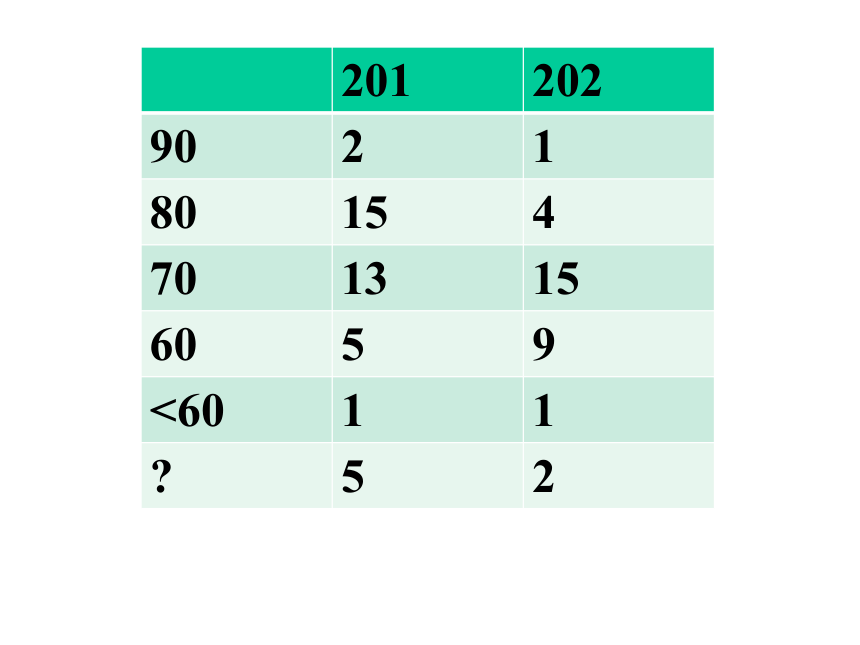
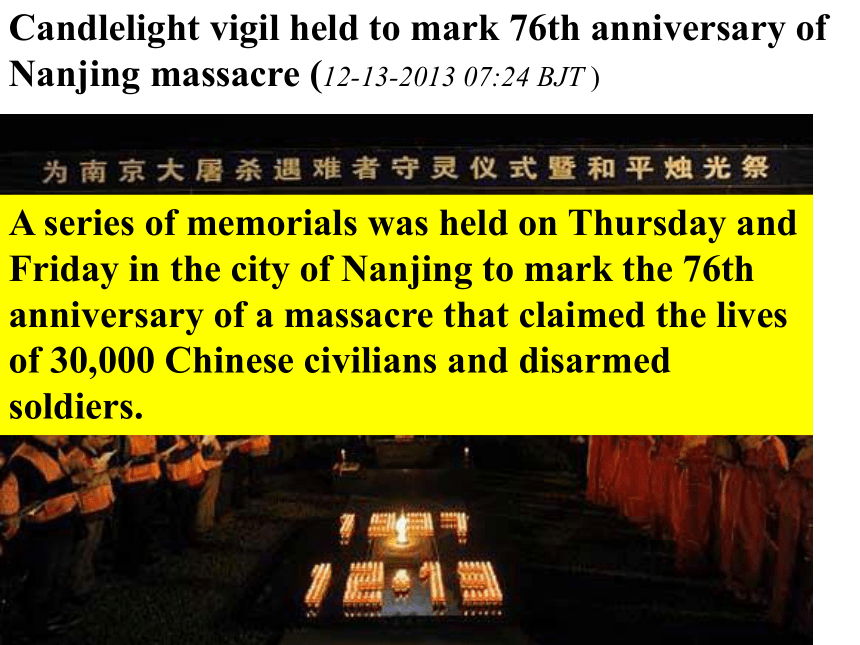
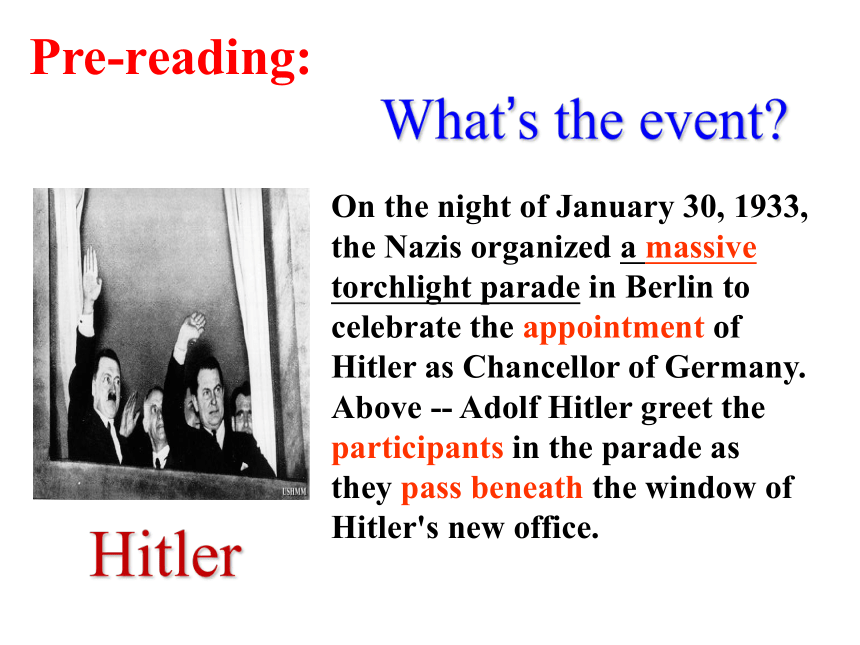
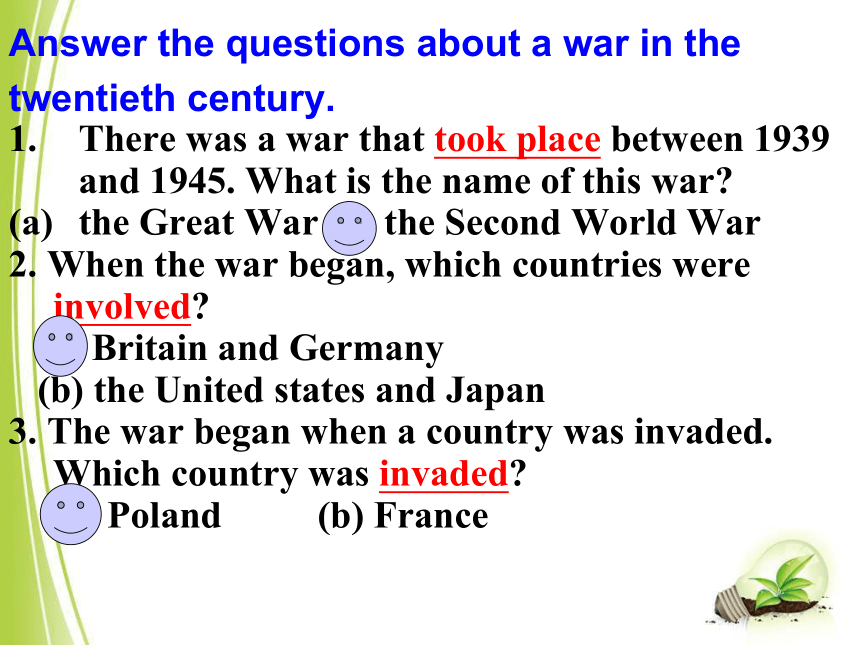
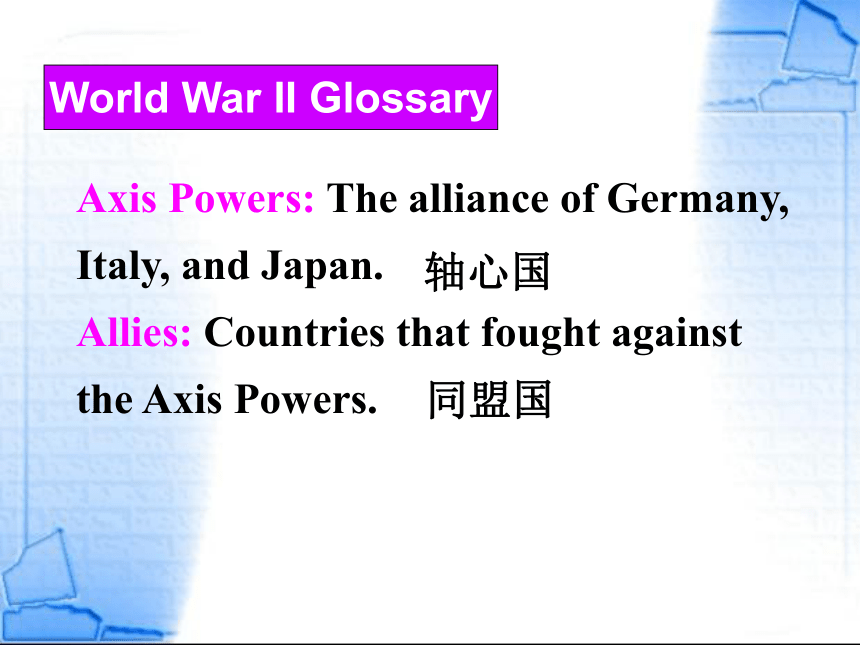
文档简介
课件64张PPT。Read the quotation about war and peace.A good soldier is not violent. A good fighter is not angry. A good winner is not vengeful.
Laozi, Chinese philosopher
善为士者不武,善战者不怒,善胜敌者不与。There has never been a good war or a bad peace.
Benjamin Franklin,
American scientistWar does not tell us who is right – only who is left.
Bertrand Russell,
British philosopherholding the right beliefsstill aliveYou cannot prevent and prepare for war at the same time.
Albert Einstein,
German-born American theoretical physicistWhat can governments do to prevent war?If everyone demanded peace instead of another TV set, we’d have peace.
John Lennon,
British musician1 使惊吓
2 追逐
3 使厌烦
4 感情;情绪
5 谋杀
6 拒绝
7 呼吸
8 对照
9 有益的
10 治愈
11 假想的
12 难以置信的
13 透明的
14程序
15 解开
16 有争议的
17 有效的
18 可选择的
19 复制
20 特别的;非凡的
21暴力
22 易适应的
23 法规;条例
24 方便的
25 抵抗
26 分析
28陪同
29 吸收
30 发生
13.李敏严于律己,乐于助人。
14. 时间有限但知识无限。一个学生应该知道如何利用时间并且尽可能多地储备知识。
15.我们应该养成一个好习惯,明智地利用时间。13. 李敏严于律己,乐于助人。
Li Min is very strict with herself in her work and daily life, and is always ready to help other people.
?14.时间有限但知识无限。一个学生应该知道如何利用时间并且尽可能多地储备知识。
Time is limited but knowledge is boundless. A student should know how to make full use
of time and store up as much knowledge as possible.
?15.我们应该养成一个好习惯,明智地利用时间。
We should get into the good habit of using our time wisely.
Candlelight vigil held to mark 76th anniversary of Nanjing massacre (12-13-2013 07:24 BJT )
A series of memorials was held on Thursday and Friday in the city of Nanjing to mark the 76th anniversary of a massacre that claimed the lives of 30,000 Chinese civilians and disarmed soldiers.What’s the event?Pre-reading:On the night of January 30, 1933, the Nazis organized a massive torchlight parade in Berlin to celebrate the appointment of Hitler as Chancellor of Germany. Above -- Adolf Hitler greet the participants in the parade as they pass beneath the window of Hitler's new office. HitlerAnswer the questions about a war in the twentieth century.There was a war that took place between 1939 and 1945. What is the name of this war?
the Great War (b) the Second World War
2. When the war began, which countries were involved?
(a) Britain and Germany
(b) the United states and Japan
3. The war began when a country was invaded. Which country was invaded? (a) Poland (b) France
World War II Glossary轴心国同盟国Axis Powers: The alliance of Germany, Italy, and Japan.
Allies: Countries that fought against the Axis Powers. Allied Expeditionary Force (AEF): Twelve nations supplied troops and material for it, including the United States, Canada, France and the United Kingdom.同盟国远征军abandon attempt danger kill1. British and American troops _________ to land in France.
2. These landings were very __________.
3. Many troops were ______ during the landings.
4. At one point, military commanders thought about ___________ the operation.attempteddangerouskilledabandoningoperation overlord霸王行动 : code name for the military operation in 1944 to invade France.Map of D-Day LandingsOmaha(奥马哈)American troops invading Normandy.At Utah Beach(犹他滩), members of a company help others whose landing craft was sunk by the Germans off the coast of France. The survivors reached Utah Beach, by using a life raft.Medics help an injured American soldier.
SoldiersApproaching the French coast.
Waiting to land on the French beach.
What kind of people can you see in the photo?
Where on the map do you think the photograph was taken?
What are the people in the photograph doing?Look at the photograph and the map and answer the questions. The D-Day LandingsPassage 1
Passage 2
Passage 3A. great losses of the
soldiers of Able Company
B. an event related to the
Second World War
C. the most important battle during the Second
World War ----Operation OverlordMatch the two parts according to your reading. The Second World War
1. Lasting years:
2. Start time:
3. End time:
4.joining countries:
5. Cause:
6.The important battle :Carefully reading Read Passage 1 and make notes:6 years ( from 1939– 1945)19391945US, Britain, Germany, CanadaBritain declared war on Germany after Germany invaded Poland.Operation OverlordRead the passage 1 and answer the
following questions.What event started the Second World War?
Germany’s invasion of Poland.
2. What was the purpose of Operation Overlord?
To invade France.
3. What nationality were the troops taking part in the landing?
British, American and Canadian.
4. Where was the most dangerous place to land?
Omaha Beach.
The operation was extremely dangerous and many soldiers were killed before they even got off the boats.这次登陆行动异常危险很多士兵还没来得及下船就牺牲了。1Detailed reading: which sentence can be replaced
by the following one? At first Operation Overlord seemed dangerous and the situation was at a mess, but finally it was successful because the soldiers fought bravely.Operation Overlord started as a story of danger and confusion and ended as a story of bravery and acts of heroism.霸王行动以危险和混乱开始,却以英勇和无畏结束。During the Second World War, Germany ________ many countries. The most important battle of the war in Europe was __________________. It started when soldiers landed on the ___________________ in France. 5,000 ships crossed the _______________, carrying 130,000 troops to the French coast.
The United States, Britain and ________ took part in the battle. The operation was extremely ___________ and thousands of soldiers were killed. American soldiers tried to ______ at the most dangerous place, Omaha Beach. The _________ was very bad but they eventually made a(n) _____________. The D-Day landings were ___________.
occupied Operation Overlord beaches of Normandy English Channel Canadadangerous land situation breakthroughsuccessfulRead passage 2 and choose the best
answers on P73.abbabMain idea: a discription of a company trying to land the beach in the operation
Drown oneself投水自尽
Don't play by the river in case you fall in and drown!
Be drowned 被淹The child was rescued from the fire.
Rescue sb from danger2 thirds of the soldiers drowned.
2 thirds of the ink was used up.If?they?had?reached?the?beach,they?would?probably?have?been?killed.要是他们抵达了海滩就很有可能没命了.2 3. Half an hour after the first attack, two thirds of the company were dead.
4. The survivors lay on the beach, exhausted and shocked.第一次进攻开始之后半小时,该连队三分之二的将士都阵亡了。死里逃生的战士躺在海滩上,疲惫不堪,心有余悸.On the morning of ________ 1944, the soldiers of Able Company crossed the English Channel. When they were about _____ kilometres from the beach, the Germans started firing at them. Boat ___ was hit and six men drowned. ________ men were saved by other boats.
When Boat _____ was a few metres from the beach, the soldiers jumped out so that some drowned. Many were killed or wounded by ____________ fire. Most of the soldiers on Boat 1 and Boat 4 drowned. Half an hour after the first attack, ___________ of the company were dead.
After an hour and forty-five minutes, six of the survivors tried to get off the beach, but only _______ joined a group from another company.
6 June 55 Twenty 3 machine gun two thirdstwoPassage 3 World War II CemeteryWorld War II Memorial In FranceWorld War II Memorial In U.S.A.The cemetery and memorial, situated on a cliff, were built to commemorate (make people remember) the lost soldiers, overlooking the beach and the English Channel.=which was situated on= which overlookRead Passage 3 again and answer the questions.1. Why was 6 June 2004 an important date for the survivors?
It was the 60th anniversary of the landings.
2. Why do you think so many soldiers were never found?
They were drowned or blown up.
3. In your own words, what does the poem say about the lost soldiers?
It says that they are not really lost because we will always remembers them.
The poem For the Fallen was written _____.
A. at the beginning of the Second
World War
B. at the end of the Second World War
C. after the Second World War
D. before the Second World WarD他们永远不会变老,当我们活着的人们都已老朽; 年华不能使他们厌倦,岁月也不会让他们愧疚; 日出日落,我们缅怀他们直到永久。They shall not grow old,
as we that are left grow old.
Age shall not weary them,
nor the years condemn.
At the going down of the sun and in the morning
We will remember them.2) The cemetery and memorial are situated on a cliff overlooking the beach and the English Channel, from where the boats attempted their landings.
【仿写】艾里斯站在窗前,从那儿她能看得到同学们打篮球.
非限制性定语从句墓地和纪念碑坐落在一处悬崖之上,从那里可以俯瞰海滩和英吉利海峡,当时一艘艘船只就试图从那里登陆.Alice stood in front of the window, from where she could watch her classmates playing basketball.5 On the 6th June 2004, ________ of the D-Day Landings from many different countries returned to ______ to remember their lost comrades. They went to the _________ and _________ which are _______ on a cliff overlooking the beach and the English Channel, from where the boats _________ their landings. On the memorial there is part of a poem called “_____________”.
survivorsFrancecemeterymemorialsituatedattemptedFor the Fallen war or peace?We hate war .
We want peace.
Let’s build a peaceful world.Now,most of the people around the world are enjoying the peace.When we are reading a novel describing the war,no matter it is the First or the Second World War,we can imagine the bitterness, sadness and hopelessness that the war brought us. Nobody would like to forget it. So that is why most people are struggling for a much more beautiful and peaceful world. Let's work harder to get rid of any kind of fights and conflicts. Wish that the different nations unite to fight against the war.3) James Ryan is the fourth brother to be involved in the Second World War.
【仿写】今天他是第一个到校的.詹姆斯. 瑞恩是被卷入第二次世界大战漩涡的第四个兄弟. He is the first to come to school today. 1. vengeful adj.
very eager to punish someone who has harmed you
复仇的, 报复心切的
e.g. 复仇之神 a vengeful God2. invade vt.
(1)?侵略(他国等), 入侵……
e.g. 德国于1939年入侵波兰。
Germany invaded Poland in 1939.
(2)? invade (人) 涌入(城市等)
e.g. 每年夏天许多旅游者涌入那个城市。
Many tourists invade the city every
summer.
(3)?侵犯(人的权利等), 侵扰(生活)
e.g. 侵扰某人的隐私
invade a person’s privacy
? invasion n. 侵略
invader n. 入侵者3. abandon v.
(1) 抛弃(某人), 遗弃, 弃(船)等而去, (下车、船等)置之不顾
abandon + n.
e.g. 背弃祖国 / 朋友
abandon one’s country/friends (2)??中止, 断念, 放弃
e.g. 他放弃了这个计划。
He abandoned the plan.
革除恶习 abandon a bad habit
放弃希望 abandon one’s hope 4. declare “宣布, 声称, 声明”, 常跟名词、从句和复合结构
(1)?跟名词
e.g. 之后, 美国对日本宣战。 After that the United States declared war on / upon Japan.
保加利亚在1908年宣告独立。 Bulgaria declared the independence in 1908. (2)?跟从句
e.g. 被控告者声称他无罪。 The accused man declared that he was not guilty.
我们宣布启动工程。 We declare that time has come to start our project.(3) 跟复合结构
e.g. 他声称自己是他们派别的人。
He declared himself to be a member of their party.
被控告者宣称自己的清白。
The accused man declared himself innocent. 学生们声明反对作弊。 The students declared themselves against cheating.5. occupy
(1) vt. 占(空间、场所、地位等), 居住于(家、房间等),占用时间
e.g. 公园占了那个城市的1/3 面积。 The park occupies a third of the city.
晚餐和演讲占用了两个钟头。 The dinner and speeches occupied 2 hours.(2) vt. (军队)占领, 占据 [occupy + 名]
e.g. 第二次世界大战后, 盟军占领了那个国家好几年。 The allied forces occupied that country for several years after World War II.(3) [be occupied with / in] = [occupy oneself with / in] 正从事……, 专心于……
e.g. 我一直专心读历史书。 I have been occupied in reading history books. 他从事种种项目。 He occupied himself with various projects.
occupation n.
职业, 固定工作, 居住, 占有 6. drown
(1)?vt. / vi. 沉没, 淹没, 淹死
e.g. 那人溺死在河中。
The man drowned in the river.
(2) vt. 使淹没,使湿透
e.g.洪水淹没了许多房屋。
The great flood drowned many
houses. (3)? (vt.) (噪音等)把(声音)压倒, 盖住, 淹没
[drown + 名] (常与out连用)
e.g. 她的声音被瀑布的水声给淹没了。The noise of the waterfall drowned (out) her voice.
Her voice was drowned out by the noise of the waterfall.7. weary (adj.)
(1) 疲倦的,疲惫的
e.g. 疲倦的脚 weary feet
(2)? 感到厌倦的, 感到厌烦的(不置于名词之前) [be weary of + 名] 对……
e.g. 你的说教令我厌烦。 I’m weary of your preaching.(3)? 使(人)疲倦的, 厌烦的, 感到无聊的(置于名词之前)
e.g. 令人疲倦的旅行 a weary journey
weary (vt./ vi.) 使(人) 疲倦, 感到疲倦,
使(人)厌烦e.g. 他整天走路, 感觉疲倦不堪 He was wearied with walking all day.
我不久就对那演讲感觉厌烦了。 I soon wearied of listening to the lecture.8. condemn
(1) vt. (因……) (严厉地) 责难(人、行为); 责备; 谴责
[condemn + 名 + (for 名)]
e.g. 报纸严厉谴责那政客的受贿行为。The newspapers condemned the politician for bribery.(2)?(因……) 判决 (某人)有罪, 判刑
[condemn + 名(人) + (for 名)]
e.g. 他因凶杀被判有罪而入狱。 He was condemned (for murder) and sent in prison.[condemn + 名(人)+ to 名/ to do ] 宣言(某人) ……判处……
e.g. 法官判他死刑。
The judge condemned him to
death. 1. Finish the Ex. 8 on P74.
2. Finish the exercise in the workbook.
Laozi, Chinese philosopher
善为士者不武,善战者不怒,善胜敌者不与。There has never been a good war or a bad peace.
Benjamin Franklin,
American scientistWar does not tell us who is right – only who is left.
Bertrand Russell,
British philosopherholding the right beliefsstill aliveYou cannot prevent and prepare for war at the same time.
Albert Einstein,
German-born American theoretical physicistWhat can governments do to prevent war?If everyone demanded peace instead of another TV set, we’d have peace.
John Lennon,
British musician1 使惊吓
2 追逐
3 使厌烦
4 感情;情绪
5 谋杀
6 拒绝
7 呼吸
8 对照
9 有益的
10 治愈
11 假想的
12 难以置信的
13 透明的
14程序
15 解开
16 有争议的
17 有效的
18 可选择的
19 复制
20 特别的;非凡的
21暴力
22 易适应的
23 法规;条例
24 方便的
25 抵抗
26 分析
28陪同
29 吸收
30 发生
13.李敏严于律己,乐于助人。
14. 时间有限但知识无限。一个学生应该知道如何利用时间并且尽可能多地储备知识。
15.我们应该养成一个好习惯,明智地利用时间。13. 李敏严于律己,乐于助人。
Li Min is very strict with herself in her work and daily life, and is always ready to help other people.
?14.时间有限但知识无限。一个学生应该知道如何利用时间并且尽可能多地储备知识。
Time is limited but knowledge is boundless. A student should know how to make full use
of time and store up as much knowledge as possible.
?15.我们应该养成一个好习惯,明智地利用时间。
We should get into the good habit of using our time wisely.
Candlelight vigil held to mark 76th anniversary of Nanjing massacre (12-13-2013 07:24 BJT )
A series of memorials was held on Thursday and Friday in the city of Nanjing to mark the 76th anniversary of a massacre that claimed the lives of 30,000 Chinese civilians and disarmed soldiers.What’s the event?Pre-reading:On the night of January 30, 1933, the Nazis organized a massive torchlight parade in Berlin to celebrate the appointment of Hitler as Chancellor of Germany. Above -- Adolf Hitler greet the participants in the parade as they pass beneath the window of Hitler's new office. HitlerAnswer the questions about a war in the twentieth century.There was a war that took place between 1939 and 1945. What is the name of this war?
the Great War (b) the Second World War
2. When the war began, which countries were involved?
(a) Britain and Germany
(b) the United states and Japan
3. The war began when a country was invaded. Which country was invaded? (a) Poland (b) France
World War II Glossary轴心国同盟国Axis Powers: The alliance of Germany, Italy, and Japan.
Allies: Countries that fought against the Axis Powers. Allied Expeditionary Force (AEF): Twelve nations supplied troops and material for it, including the United States, Canada, France and the United Kingdom.同盟国远征军abandon attempt danger kill1. British and American troops _________ to land in France.
2. These landings were very __________.
3. Many troops were ______ during the landings.
4. At one point, military commanders thought about ___________ the operation.attempteddangerouskilledabandoningoperation overlord霸王行动 : code name for the military operation in 1944 to invade France.Map of D-Day LandingsOmaha(奥马哈)American troops invading Normandy.At Utah Beach(犹他滩), members of a company help others whose landing craft was sunk by the Germans off the coast of France. The survivors reached Utah Beach, by using a life raft.Medics help an injured American soldier.
SoldiersApproaching the French coast.
Waiting to land on the French beach.
What kind of people can you see in the photo?
Where on the map do you think the photograph was taken?
What are the people in the photograph doing?Look at the photograph and the map and answer the questions. The D-Day LandingsPassage 1
Passage 2
Passage 3A. great losses of the
soldiers of Able Company
B. an event related to the
Second World War
C. the most important battle during the Second
World War ----Operation OverlordMatch the two parts according to your reading. The Second World War
1. Lasting years:
2. Start time:
3. End time:
4.joining countries:
5. Cause:
6.The important battle :Carefully reading Read Passage 1 and make notes:6 years ( from 1939– 1945)19391945US, Britain, Germany, CanadaBritain declared war on Germany after Germany invaded Poland.Operation OverlordRead the passage 1 and answer the
following questions.What event started the Second World War?
Germany’s invasion of Poland.
2. What was the purpose of Operation Overlord?
To invade France.
3. What nationality were the troops taking part in the landing?
British, American and Canadian.
4. Where was the most dangerous place to land?
Omaha Beach.
The operation was extremely dangerous and many soldiers were killed before they even got off the boats.这次登陆行动异常危险很多士兵还没来得及下船就牺牲了。1Detailed reading: which sentence can be replaced
by the following one? At first Operation Overlord seemed dangerous and the situation was at a mess, but finally it was successful because the soldiers fought bravely.Operation Overlord started as a story of danger and confusion and ended as a story of bravery and acts of heroism.霸王行动以危险和混乱开始,却以英勇和无畏结束。During the Second World War, Germany ________ many countries. The most important battle of the war in Europe was __________________. It started when soldiers landed on the ___________________ in France. 5,000 ships crossed the _______________, carrying 130,000 troops to the French coast.
The United States, Britain and ________ took part in the battle. The operation was extremely ___________ and thousands of soldiers were killed. American soldiers tried to ______ at the most dangerous place, Omaha Beach. The _________ was very bad but they eventually made a(n) _____________. The D-Day landings were ___________.
occupied Operation Overlord beaches of Normandy English Channel Canadadangerous land situation breakthroughsuccessfulRead passage 2 and choose the best
answers on P73.abbabMain idea: a discription of a company trying to land the beach in the operation
Drown oneself投水自尽
Don't play by the river in case you fall in and drown!
Be drowned 被淹The child was rescued from the fire.
Rescue sb from danger2 thirds of the soldiers drowned.
2 thirds of the ink was used up.If?they?had?reached?the?beach,they?would?probably?have?been?killed.要是他们抵达了海滩就很有可能没命了.2 3. Half an hour after the first attack, two thirds of the company were dead.
4. The survivors lay on the beach, exhausted and shocked.第一次进攻开始之后半小时,该连队三分之二的将士都阵亡了。死里逃生的战士躺在海滩上,疲惫不堪,心有余悸.On the morning of ________ 1944, the soldiers of Able Company crossed the English Channel. When they were about _____ kilometres from the beach, the Germans started firing at them. Boat ___ was hit and six men drowned. ________ men were saved by other boats.
When Boat _____ was a few metres from the beach, the soldiers jumped out so that some drowned. Many were killed or wounded by ____________ fire. Most of the soldiers on Boat 1 and Boat 4 drowned. Half an hour after the first attack, ___________ of the company were dead.
After an hour and forty-five minutes, six of the survivors tried to get off the beach, but only _______ joined a group from another company.
6 June 55 Twenty 3 machine gun two thirdstwoPassage 3 World War II CemeteryWorld War II Memorial In FranceWorld War II Memorial In U.S.A.The cemetery and memorial, situated on a cliff, were built to commemorate (make people remember) the lost soldiers, overlooking the beach and the English Channel.=which was situated on= which overlookRead Passage 3 again and answer the questions.1. Why was 6 June 2004 an important date for the survivors?
It was the 60th anniversary of the landings.
2. Why do you think so many soldiers were never found?
They were drowned or blown up.
3. In your own words, what does the poem say about the lost soldiers?
It says that they are not really lost because we will always remembers them.
The poem For the Fallen was written _____.
A. at the beginning of the Second
World War
B. at the end of the Second World War
C. after the Second World War
D. before the Second World WarD他们永远不会变老,当我们活着的人们都已老朽; 年华不能使他们厌倦,岁月也不会让他们愧疚; 日出日落,我们缅怀他们直到永久。They shall not grow old,
as we that are left grow old.
Age shall not weary them,
nor the years condemn.
At the going down of the sun and in the morning
We will remember them.2) The cemetery and memorial are situated on a cliff overlooking the beach and the English Channel, from where the boats attempted their landings.
【仿写】艾里斯站在窗前,从那儿她能看得到同学们打篮球.
非限制性定语从句墓地和纪念碑坐落在一处悬崖之上,从那里可以俯瞰海滩和英吉利海峡,当时一艘艘船只就试图从那里登陆.Alice stood in front of the window, from where she could watch her classmates playing basketball.5 On the 6th June 2004, ________ of the D-Day Landings from many different countries returned to ______ to remember their lost comrades. They went to the _________ and _________ which are _______ on a cliff overlooking the beach and the English Channel, from where the boats _________ their landings. On the memorial there is part of a poem called “_____________”.
survivorsFrancecemeterymemorialsituatedattemptedFor the Fallen war or peace?We hate war .
We want peace.
Let’s build a peaceful world.Now,most of the people around the world are enjoying the peace.When we are reading a novel describing the war,no matter it is the First or the Second World War,we can imagine the bitterness, sadness and hopelessness that the war brought us. Nobody would like to forget it. So that is why most people are struggling for a much more beautiful and peaceful world. Let's work harder to get rid of any kind of fights and conflicts. Wish that the different nations unite to fight against the war.3) James Ryan is the fourth brother to be involved in the Second World War.
【仿写】今天他是第一个到校的.詹姆斯. 瑞恩是被卷入第二次世界大战漩涡的第四个兄弟. He is the first to come to school today. 1. vengeful adj.
very eager to punish someone who has harmed you
复仇的, 报复心切的
e.g. 复仇之神 a vengeful God2. invade vt.
(1)?侵略(他国等), 入侵……
e.g. 德国于1939年入侵波兰。
Germany invaded Poland in 1939.
(2)? invade (人) 涌入(城市等)
e.g. 每年夏天许多旅游者涌入那个城市。
Many tourists invade the city every
summer.
(3)?侵犯(人的权利等), 侵扰(生活)
e.g. 侵扰某人的隐私
invade a person’s privacy
? invasion n. 侵略
invader n. 入侵者3. abandon v.
(1) 抛弃(某人), 遗弃, 弃(船)等而去, (下车、船等)置之不顾
abandon + n.
e.g. 背弃祖国 / 朋友
abandon one’s country/friends (2)??中止, 断念, 放弃
e.g. 他放弃了这个计划。
He abandoned the plan.
革除恶习 abandon a bad habit
放弃希望 abandon one’s hope 4. declare “宣布, 声称, 声明”, 常跟名词、从句和复合结构
(1)?跟名词
e.g. 之后, 美国对日本宣战。 After that the United States declared war on / upon Japan.
保加利亚在1908年宣告独立。 Bulgaria declared the independence in 1908. (2)?跟从句
e.g. 被控告者声称他无罪。 The accused man declared that he was not guilty.
我们宣布启动工程。 We declare that time has come to start our project.(3) 跟复合结构
e.g. 他声称自己是他们派别的人。
He declared himself to be a member of their party.
被控告者宣称自己的清白。
The accused man declared himself innocent. 学生们声明反对作弊。 The students declared themselves against cheating.5. occupy
(1) vt. 占(空间、场所、地位等), 居住于(家、房间等),占用时间
e.g. 公园占了那个城市的1/3 面积。 The park occupies a third of the city.
晚餐和演讲占用了两个钟头。 The dinner and speeches occupied 2 hours.(2) vt. (军队)占领, 占据 [occupy + 名]
e.g. 第二次世界大战后, 盟军占领了那个国家好几年。 The allied forces occupied that country for several years after World War II.(3) [be occupied with / in] = [occupy oneself with / in] 正从事……, 专心于……
e.g. 我一直专心读历史书。 I have been occupied in reading history books. 他从事种种项目。 He occupied himself with various projects.
occupation n.
职业, 固定工作, 居住, 占有 6. drown
(1)?vt. / vi. 沉没, 淹没, 淹死
e.g. 那人溺死在河中。
The man drowned in the river.
(2) vt. 使淹没,使湿透
e.g.洪水淹没了许多房屋。
The great flood drowned many
houses. (3)? (vt.) (噪音等)把(声音)压倒, 盖住, 淹没
[drown + 名] (常与out连用)
e.g. 她的声音被瀑布的水声给淹没了。The noise of the waterfall drowned (out) her voice.
Her voice was drowned out by the noise of the waterfall.7. weary (adj.)
(1) 疲倦的,疲惫的
e.g. 疲倦的脚 weary feet
(2)? 感到厌倦的, 感到厌烦的(不置于名词之前) [be weary of + 名] 对……
e.g. 你的说教令我厌烦。 I’m weary of your preaching.(3)? 使(人)疲倦的, 厌烦的, 感到无聊的(置于名词之前)
e.g. 令人疲倦的旅行 a weary journey
weary (vt./ vi.) 使(人) 疲倦, 感到疲倦,
使(人)厌烦e.g. 他整天走路, 感觉疲倦不堪 He was wearied with walking all day.
我不久就对那演讲感觉厌烦了。 I soon wearied of listening to the lecture.8. condemn
(1) vt. (因……) (严厉地) 责难(人、行为); 责备; 谴责
[condemn + 名 + (for 名)]
e.g. 报纸严厉谴责那政客的受贿行为。The newspapers condemned the politician for bribery.(2)?(因……) 判决 (某人)有罪, 判刑
[condemn + 名(人) + (for 名)]
e.g. 他因凶杀被判有罪而入狱。 He was condemned (for murder) and sent in prison.[condemn + 名(人)+ to 名/ to do ] 宣言(某人) ……判处……
e.g. 法官判他死刑。
The judge condemned him to
death. 1. Finish the Ex. 8 on P74.
2. Finish the exercise in the workbook.
